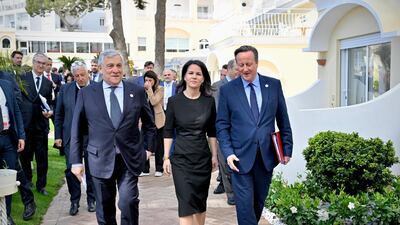Live updates: Follow the latest on Israel-Gaza
The G7 countries on Friday urged feuding Middle East powers to take steps towards peace as they condemned Iran for causing a "dangerous escalation" by attacking Israel.
In a lengthy joint statement on the Middle East, G7 foreign ministers threatened more sanctions on Iran for "malicious and destabilising actions" as the West seeks an "active role" in calming the region.
After reports of an overnight Israeli retaliation, the ministers from the US, Britain, France, Germany, Italy, Canada and Japan urged both sides to "work to prevent further escalation".
"We call on all parties, both in the region and beyond, to offer their positive contribution to this collective effort," they said after three days of talks in Capri, Italy.
The plea for peace also included a call from the G7 for a ceasefire in Gaza, as the US said Hamas had "rejected generous proposals" from Israel.
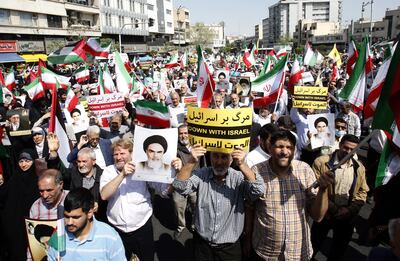
Middle East tensions overshadowed the G7 talks after Iran launched an unprecedented drone and missile barrage at Israel last weekend, saying it was retaliating for an attack on its Damascus consulate.
Friday's apparent Israeli strike on the Iranian city of Isfahan - in which the US denied involvement - derailed the meeting further as discussions on the Indo-Pacific were sidelined for more Middle East talks.
Italy's Foreign Minister Antonio Tajani said the G7 countries "want this part of the conflict between Iran and Israel to come to an end". UK Prime Minister Rishi Sunak called for "calm heads to prevail".
The US and UK announced new sanctions on Iranian military commanders and drone manufacturers during the meeting, but the G7 as a whole did not agree specific new measures.
However, they "stand ready to adopt further sanctions" if Iran and its proxies do not stop carrying out attacks.
The G7 would also take "new and significant measures" if Iran were to provide Russia with ballistic missiles, the ministers said.
"We’ve not just taken a photograph of the situation," Mr Tajani said. "The G7 committed itself to a political role to bring peace to the Middle East."
In a 2,500-word communique on the Middle East:
· The G7 condemned a series of Iranian actions such as seizing a merchant vessel, supporting Hamas and Hezbollah, enriching uranium and repressing dissent at home
· The ministers said they oppose an Israeli attack on Rafah, in the south of Gaza, and demanded a "credible plan" from Israel to protect its civilians
· Israel was asked to "do more" to protect aid workers and told to bring violent settlers to justice, while Hamas was condemned for its violent acts and "refusal to release hostages"
· Concern was raised that Houthi attacks against Red Sea shipping are affecting energy supplies and the shipping of humanitarian aid in the region
· Ministers said they remain committed to a Syrian peace process and accountability for war crimes, as well as efforts to resolve the conflict in Yemen.
Italy said the US had shared with G7 partners that it was "informed at the last minute" about Friday's apparent Israeli strike against Iran.
US Secretary of State Antony Blinken did not deny this but said Washington had "not been involved in any offensive operations".
He said the US was "committed to Israel's security" but also "to de-escalating, to trying to bring this tension to a close".
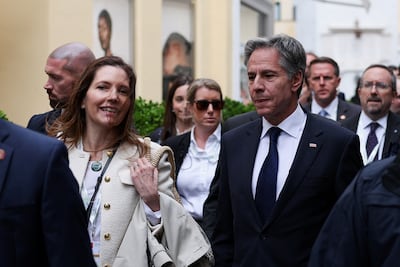
Israel has taken "important steps" to increase the flow of aid to Gaza but "we need to see sustained results", Mr Blinken said.
However, he said "the only thing standing between the Gazan people and a ceasefire is Hamas"'.
"It’s rejected generous proposals from Israel, it seems more interested in a regional conflict than it is in a ceasefire that would immediately improve the lives of the Palestinian people," Mr Blinken said.
He hailed what he called a commitment by the G7 to hold Iran to account including by "degrading its missile and drone capability".
Iran threats
The G7 statement aired a long list of grievances with Iran, leading with what it called the "dangerous escalation" of the attack on Israel.
"Iran’s actions mark an unacceptable step towards the destabilisation of the region and a further escalation, which must be avoided," it said.
The G7 urged all countries to prevent Iran from acquiring drone and missile parts, amid calls in Europe to widen the scope of sanctions linked to Russia.
If Iran gives missiles to Russia the G7 is "prepared to respond in a swift and co-ordinated manner, including with new and significant measures against Iran", it said.
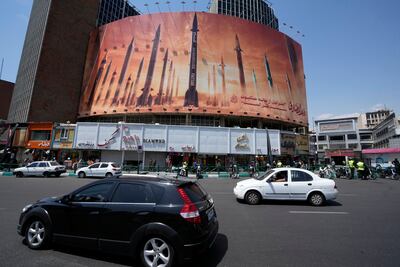
Iran was urged to "cease and reverse nuclear escalations" in which it has enriched uranium beyond what diplomats say could be any civilian use.
Also raised was Iran's treatment of domestic protesters and its habit of taking dual nationals as prisoners, widely seen as a bargaining tactic.
"We condemn Iran’s harassment, intimidation and plots to kill perceived dissidents and opponents of the regime overseas," the statement said.
Gaza appeals
The G7 ministers said an "unacceptable number of civilians" had been killed in Gaza as it demanded that Israel act "humanely and with dignity".
They urged Israel to move quickly to meet pledges to speed up the entry of humanitarian aid through new land and sea routes.
"We call on Israel to do more to ensure protection of international and local humanitarian aid workers, journalists, and Palestinian civilians," they said.
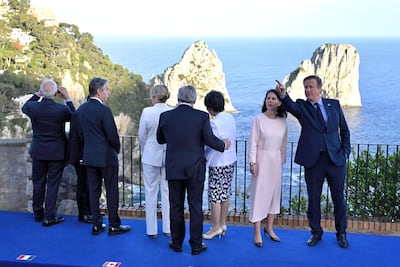
In a call for a "sustainable ceasefire", the G7 said it supports US-brokered efforts for a truce that would involve the return of Israeli hostages taken by Hamas.
"We are also working, including by imposing sanctions and other measures, to deny Hamas the ability to raise funds to carry out further atrocities," the ministers said.
They urged both sides not to "undermine the prospect of a two-state solution" as they called for rising levels of violence by Israeli settlers to be reined in.
Regional conflicts
Yemen's Houthis were urged to release shipping crews taken hostage during their attacks on Red Sea shipping, which were condemned by the G7.
It warned that of a "hindrance to the transit of energy supplies, raw materials and other commodities" through the Red Sea affecting countries in the region.
Free navigation in the area is essential for the delivery of humanitarian assistance to more than half the population of Yemen and to Sudan and Ethiopia, the ministers said.
They called on the Houthis and other warring parties in Yemen to engage in a peace process amid "great concern" for its humanitarian state.
Syria's government was likewise urged to "engage meaningfully" in a political process, with sanctions relief only possible once that occurs.
Peace in Syria "cannot be achieved" without the enduring defeat of ISIS, the G7 said.
Anti-ISIS forces led by the US remain stationed in the region and some were diverted to intercept Iran's attack on Israel last weekend.
